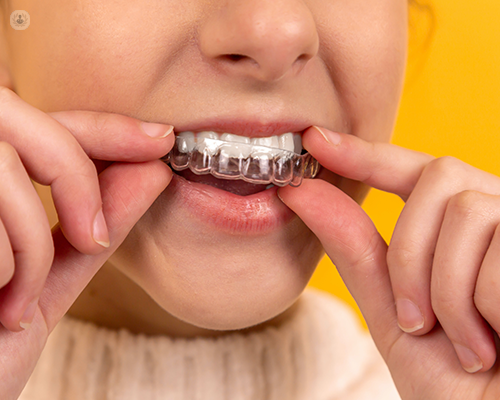Bruxism: a nightguard to prevent teeth grinding
Escrito por:Teeth grinding, also known as bruxism, can cause permanent damage to your teeth. Specialist in prosthodontics, Professor Christian Mehl, talks to Top Doctors about seeking medical attention for the condition and using a nightguard to help treat it.

What are the symptoms of bruxism?
When patients subconsciously grind their teeth at night or during the day, the hard tooth substance (enamel) gradually gets worn away. Other typical side effects are headaches, cracking jaw joints and neck pain as well as tinnitus. A bite splint protects the teeth and relaxes the muscles.
Causes of bruxism (teeth grinding)
The actual causes of teeth grinding at night remain a matter of debate. Stress is believed to be a common trigger. Around 80 per cent of the population grinds their teeth during the night. Other potential triggers could be misaligned teeth or poorly adapted fillings or crowns.
Clinical and instrumental functional analysis in bruxism
Splint therapy has several advantages as it relaxes the cramped jaw muscles and protects the teeth at the same time. Firstly, your dentist will conduct a functional analysis. There are two types:
- clinical
- instrumental functional analysis
During the clinical analysis, the dentist examines the masticatory muscles and the jaw, and can detect whether there is a restriction in the opening of the mouth.
The instrumental analysis enables closer examination of the jaws in relation to each other. The dentist will examine the temporomandibular joint, the jaws in relation to one another, as well as the position of the jaws in the skull. In cases of confirmed bruxism, a nightguard therapy is recommended.
Treatment of teeth grinding with a nightguard
The nightguard is made individually for each patient. To do this, your dentist will take an impression of your teeth. In our clinic, we use the full digital CAD/CAM workflow which is a digital scanning process so eliminates the need for the traditional putty/alginate impression tray, thus it is more comfortable. Your personalised nightguard is then made.
The nightguard must be fitted in the dental clinic since the fit has to be checked thoroughly. Small adjustments can still be made to ensure the nightguard fits your mouth perfectly. In most cases, with the help of the nightguard, we see a significant improvement on muscle relaxation, teeth damage protection as well as sleep quality.
Grinding teeth: interdisciplinary symptoms
Although a nightguard can help ease the impact of teeth grinding, it is important to consider the underlying factors. Relaxation exercises such as autogenic training and yoga could help with stress and relieving night-time teeth grinding. Physiotherapy might also help to relax the cramped masticatory muscles.
If you have bruxism or are experiencing similar symptoms, Professor Mehl provides expert diagnosis, treatment and advice. Visit his Top Doctors profile, here, to arrange an appointment.


